HLS stages ‘Crucible’ with new emphasis
First faculty-led theatrical production at HLS is different ‘Crucible’
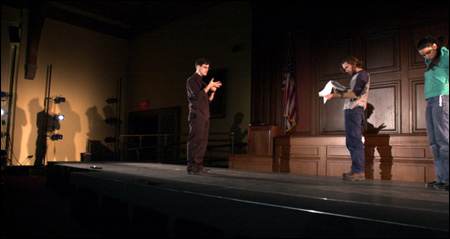
When Harvard Law School (HLS) Dean Elena Kagan charged the faculty with enhancing the intellectual life of the Law School, many of them convened conferences, booked speakers, and hosted seminars on legal issues of the day.
Professor of Law Bruce Hay took a different tack: He’s directing the Law School’s first faculty-led theatrical production. “It occurred to me that it also might be a nice complement to have an artistic forum in which people are provoked into thinking about legal issues and moral issues,” says Hay, whose production of Arthur Miller’s “The Crucible,” with a cast composed of HLS and Harvard College students, goes up April 20.
At first blush an unorthodox teaching tool, theater, Hay maintains, doesn’t
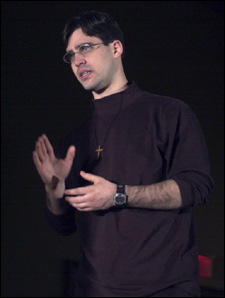
stray far from the Socratic method of teaching that is at the heart of an HLS education. After all, he says, in any classroom on any given day, students are asked to role-play defending and prosecuting lawyers and other legal roles. As a teacher, he’ll guide their discovery of the law by prodding them with questions not so different from those a director would ask his actors. Why are you doing that? What’s your intention? How would you respond?
“I find it in that respect a natural extension of what I do in the classroom,” says Hay. “I call it an experiment in legal pedagogy.”
Witches, communists in black and white
Set in 17th century Massachusetts during the Salem witch trials and commonly read as a parable of the McCarthy era of the 1950s, “The Crucible” provides rich fodder for legal minds. Hay has teased out an arresting theme that layers the play with new meaning.
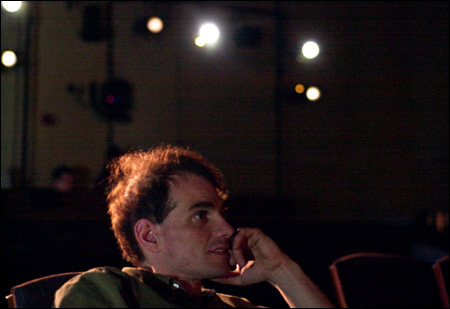
“I’m looking at it as an allegory of racial discrimination rather than McCarthyist repression of unpopular ideologies,” he says. “That just leaps out of the text for me.” His “Crucible” takes a far more literal interpretation of Miller’s metaphorical uses of “black” and “white,” where whiteness represents conforming to American ideology and “black” signifies the sort of anti-American thought that results in persecution and blacklisting.
“The play is really about society’s tendency to designate a certain group as being outsiders,” says Hay. In America in 1953, the year “The Crucible” opened, communists were outsiders. So were blacks, he says. Indeed, a black woman and her relationship with some of the white girls in the community are central to the story of “The Crucible.”
Hay brings the racial themes to the fore of the play with subtlety, using lighting, props, and bluesy music he composed. He’s also included a scene that was performed in the original production but since then existed primarily as an appendix to the play. In it, Abigail Williams, the instigator of the trials, declares her desire to “make the world white again.”
Only when his search for rehearsal space bumped into HLS’s week of events marking the 50th anniversary of Brown v. Board of Education (see page 3) did Hay realize the Brown hearings and “The Crucible’s” debut were nearly simultaneous; it’s not a leap, he says, to imagine that Miller was influenced by the racial struggles of the times.
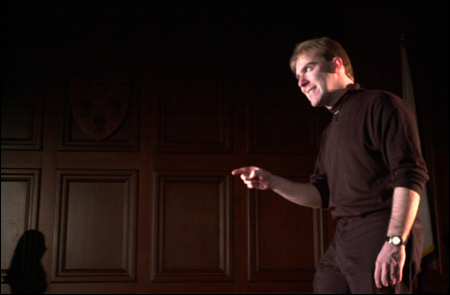
Still, says Hay, “I don’t want to draw the connection too tightly. I add the theme only obliquely.” With the exception of performing the oft-silenced scene, Hay has not changed a single word of “The Crucible.”
“I might be accused of taking liberties with the spirit of the play, but I’m certainly not changing any of the dialogue,” he says. “I don’t think Miller would think that I was departing too much from his central theme.”
‘Immensely talented’
With opening night bearing down on them, the cast and crew of “The Crucible” bring a focused intensity to a recent rehearsal in the oaken understatement of Ames Courtroom. Hay and lighting director Dina Gjertsen – borrowed from the American Repertory Theatre and one of just a few professionals involved in the production – experiment with cues on the theatrical lighting HLS installed in the courtroom.
“I owe the dean about 10 favors,” says Hay, adding that the room had to be rewired to accommodate the lighting.
A handful of the students from the cast ping-pong in and out of character, darting from the stage to their books and back again. As Elizabeth Proctor, Zoe
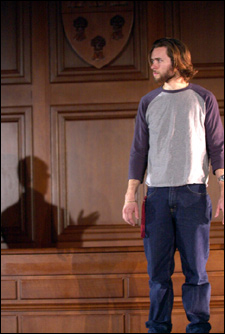
Segal-Reichlin 1L comforts her husband in his darkest hour, then opens her laptop for a quick study break while Hay and Gjertsen revise the scene’s lighting. “I totally blew my oral argument today,” she confesses to her fellow cast members, who are using their downtime to ponder which “Simpsons” character their “Crucible” personas represent. “I should have just said lines from the play, because I know them better.”
With just one month to prepare the play, Hay and the actors have focused on the nuts and bolts of production, leaving the major legal and ethical implications of “The Crucible” for the audience to ponder. Yet they haven’t been lost on the cast.
“It’s not only a lot of fun, but it’s a great play and it gives me something to think about every night,” says Kurt Dudas 3L, who plays Marshal Herrick. Dudas was tempted, he says, to use a line from the play in a recent legal argument.
“Doing [‘The Crucible’] in the context of law school has brought a new perspective to it,” says Segal-Reichlin. The play has spurred her thinking about the underpinnings of the American judicial system and its assumed infallibility. “Here’s this fascinating moment in our history when it just disintegrated,” she says.
Hay credits the success of the play to the students of the cast, most of whom bring extensive previous acting experience to “The Crucible.”
‘The Crucible’ by Arthur Miller is on stage at the Ames Courtroom Auditorium of Harvard Law School at the following times:
- April 20, 7:30 p.m.
- April 21, 7:30 p.m.
- April 23, 7:30 p.m.
- April 24, 2 and 7:30 p.m.Tickets are $8 general, $5 for students, and are available at the Harvard Box Office (617) 496-2222.
“The actors are immensely talented and have an astonishing intuitive sense of how to handle their roles,” says Hay, who has never been involved in theater before, much less directed. “Much of my job is to set up a schedule, give them general direction, and then let them go.”
Hay hopes “The Crucible” will launch regular faculty-led productions at HLS; he’s got several other plays in the wings that, while not explicitly legal in subject, probe relevant moral issues.
Although the talent and dedication of the actors guarantees a great evening of theatrical entertainment, “my hope is not to get great reviews,” says Hay. “My hope is to provoke thought and debate.”




